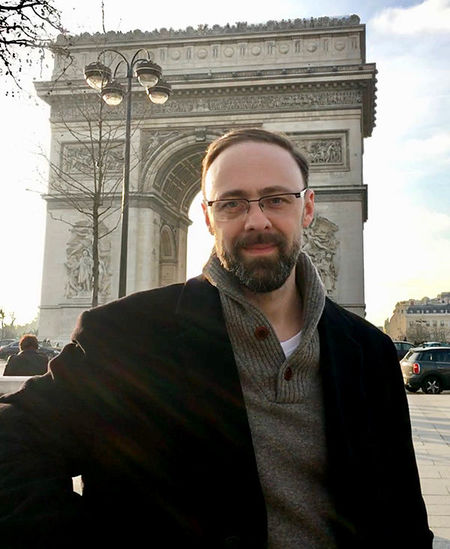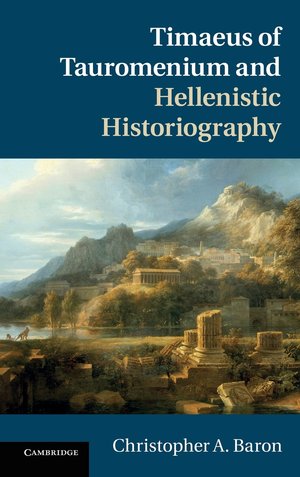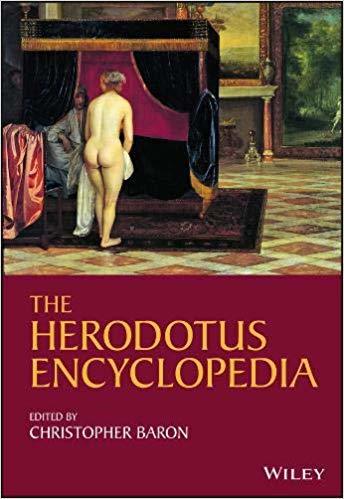
This Q&A is part of an ongoing series with Arts and Letters faculty. Read more Q&As with faculty members and graduate students here.
Christopher Baron is an associate professor in the Department of Classics, concurrent associate professor in the Department of History, and a faculty affiliate of the Nanovic Institute for European Studies. He came to Notre Dame in 2006, after receiving his Ph.D. in ancient history from the University of Pennsylvania. His interests include Greek and Roman historiography, the history of the Greeks in the Hellenistic and Roman periods, and Greek epigraphy.
What are you currently working on?
I am working on a book about ancient Greeks who wrote history while living in the Roman Empire. During this period, the inhabitants of the Greek world went from being conquered subjects of the empire to citizens of it. The Romans had conquered the Greek world in brutal fashion. But by the late second century, elite Greeks, such as Arrian and Cassius Dio, were serving as Roman senators, governors, and military commanders. At the same time, some of these men were still writing histories in Greek that used Herodotus and Thucydides as models — works that were written back in the fifth century B.C.
I’ll use seven or eight of these historians to evaluate the continuities and changes in historical writing over a period of around 350 years (30 B.C. to 340 A.D.). The basic questions I am interested in are, why do people write history? What are their methods and approaches? What place has history-writing held in various societies and cultures?

Historiography by Christopher Baron
How did you get started on this project?
My first book was on a Greek historian, Timaeus (from Tauromenium in Sicily), who wrote in the third century B.C. and was one of the first Greek authors to give serious attention to the Romans. So in a sense, my current project is a way of continuing the story of Greek historical writing — from its first contact with Rome down through a time when Greeks themselves ‘became’ Romans.
What can we learn or take away from these Greek historians today?
The connection between one’s identity — ethnic, cultural, and linguistic — and one’s attitude toward the past is a major theme of my current book. For example, what did it mean for a Greek-speaking citizen of a Greek city to write about the past (Greek or Roman) as a subject or member of the Roman Empire? There always remained some tension between Greek and Roman culture. For people who clearly had a foot in both worlds, as it were, I want to explore how that relationship affected what they said about Greek and Roman actions in the past.
We are grappling with questions of a similar nature today, both within the U.S. — what does one do with a Confederate general’s statue, for example? — and globally — how do we write the history of America’s impact on the world in the 20th century?
“The connection between one’s identity — ethnic, cultural, and linguistic — and one’s attitude toward the past is a major theme of my current book. We are grappling with questions of a similar nature today, both within the U.S. — what does one do with a Confederate general’s statue, for example? — and globally — how do we write the history of America’s impact on the world in the 20th century?”
You are also general editor of a multi-volume encyclopedia of Herodotus, coming out this year. What inspired you to take that on?
I’d like to say a moment of madness, since it has taken nearly six years of work! Herodotus is the most important of the ancient Greek historians — Cicero called him the “Father of History” — and also, in my opinion, the most fascinating. He takes an incredibly broad notion of what belongs in a work of history, which made the idea of an encyclopedia dedicated to his work especially enticing. His Histories cover an enormous range of topics: war, rulership, religion, food, animals, clothing, language, trade, travel, sex — in addition to all the people and places he mentions. When the publisher approached me about taking this project on, I was at a good time in my career, after my first book was finished, and I was ready for a new challenge.
Would I ever edit an encyclopedia again? No! In all seriousness, though, while it has been an enormous and laborious task, it has been truly rewarding. I have worked with 180 contributors in 17 countries at all levels, from masters students to senior scholars. I have been amazed at how passionate classicists and ancient historians are about the subject, and how generous they are with their time. And I like to think that Herodotus himself would be pleased with what we have produced.

What is the most interesting entry you featured?
That’s a tough question, since there are more than 2,300 entries. But the entry on “death” stands out to me, written by Maria Fragoulaki at Cardiff University. As she points out, in Herodotus’ Histories, people from all ranges of life “die in an astonishing variety of manners.” Collecting such passages into one discussion is not just an exercise in morbid curiosity — it shows how Herodotus used death to explore bigger questions of theology, morality, and psychology. That effort to connect the details of his work with the bigger picture he creates is really at the heart of what I hope the encyclopedia will accomplish.
Have you discovered anything surprising or strange while working on that project?
I was struck by the combination of accurate knowledge about things we know happened with impossible fantasy that we occasionally find in Herodotus. He deals with so many peoples, places, and cultures beyond Greece — Persia, Egypt, North Africa, India, Scythia — and he gets a lot of things correct. But he tends to see the fringes of the world as a place where things get really weird, whether it’s one-eyed men, villagers who survive by only eating fish, or gold-digging giant ants. Even though he expresses skepticism about some of the most fabulous stuff — for example, people in the Ural Mountains who hibernate for six months of the year — there are still plenty of instances where you wonder, “did he or how could he really believe that?”
How do you bring your research into the classroom?
Last semester, I taught a class on Writing History in Ancient Greece and Rome, so I pestered my students with all the questions I ask about the ancient historians. More generally, I encourage students in my history classes to think actively about how we gain knowledge: asking questions of our evidence, finding and evaluating others’ interpretations of the evidence, deciding whom to trust (or not). When I teach ancient Greek language classes to our undergraduate classics majors and master’s in classics students, we can see how subtle the ancient historians could be in crafting historical narrative and communicating the themes they wanted their readers to understand.
“I encourage students in my history classes to think actively about how we gain knowledge: asking questions of our evidence, finding and evaluating others’ interpretations of the evidence, deciding whom to trust (or not).”
Why is Notre Dame the right home for your research?
For those of us who work on ancient Greece and Rome, a good library is essential — one that has not given up on purchasing print books. I am also fortunate to have a supportive department, and conversations with my colleagues in classics and other units have helped me formulate and refine my ideas. Our students, undergraduate and graduate, are hardworking and motivated, and the questions they ask in class often lead me to see the ancient evidence in new ways.


